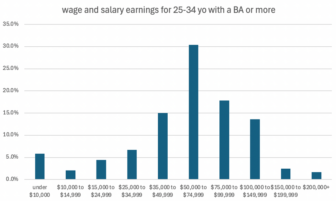A central conclusion of Michigan Future’s research over the decades is that the most prosperous places are those with the highest proportion of adults with a four year degree or more. (The only exception has been a few states that have benefited from high energy prices.) This, of course, is consistent with the economy becoming increasingly knowledge based.
Michigan’s fundamental challenge to regaining its status as a high prosperity state is that it consistently ranks in the mid thirties in college attainment. A major reason for that is that the states’ two big metros are not talent magnets. In an economy where those with a four year degree are increasingly concentrating in big metropolitan areas.
Joe Cortright in a blog for City Observatory entitled Why Talent Matters to Cities (cities meaning regions) provides an update on the alignment of college attainment with a region’s per capita income. Cortright writes:
… there’s a strong, positive correlation between educational attainment and per capita income. The metro areas with the highest levels of education have the highest levels of per capita personal income. … The coefficient of determination of the two variables–a statistical measure of the strength of the relationship–is .67, which suggests we can explain two-thirds of the variation in per capita personal income among metropolitan areas, simply by knowing what fraction of their adult population has a four-year degree.
… Over time, the strength of this relationship, and the size of the talent dividend effect has been increasing. When we computed the relationship using 2010 data, the correlation coefficient was .60 … These data suggest that educational attainment has become even more important in determining economic success than just a few years ago.
This data, Cortright continues, “tells you the most important thing you need to know about urban economic development in the 21st century: if you want a successful economy, you have to have a talented population. Cities with low levels of educational attainment will find it difficult to enjoy higher incomes; cities with higher levels of educational attainment can expect greater prosperity.”
End of story! It still is a lesson Michigan policymakers and those who most influence them are having a hard time learning. Michigan and its metropolitan areas need to make preparing, retaining and attracting talent their top economic priority. If they don’t Michigan will continue to be a low-prosperity state anchored by two low-prosperity metropolitan areas: both Detroit and Grand Rapids.






